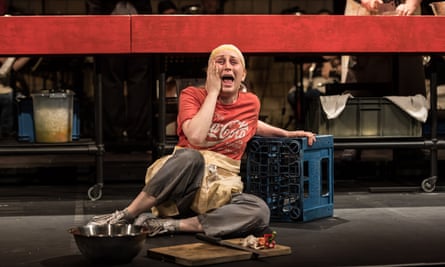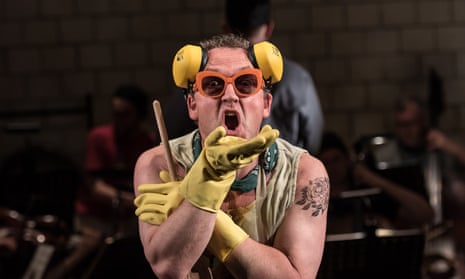Though he wrote a couple of music-theatre pieces in the 1970s, Peter Eötvös’s career as an opera composer didn’t really get underway for another quarter of a century. But since the premiere of his Three Sisters in 1998, Eötvös has been making up for lost time; nine more stage works have followed, including The Golden Dragon, which was first performed in Frankfurt two years ago and has now been brought to Britain by Music Theatre Wales. The performance at the Buxton festival was a one-off, but the company plans to tour Michael McCarthy’s production next spring.
Eötvös describes The Golden Dragon as “music theatre”. He’s adapted the text himself from the play of the same name by Roland Schimmelpfennig; the MTW production is sung in an English translation by Gregory Vajda. A brief prologue is followed by 21 scenes, mostly just as brief so that it’s all over in 90 minutes, but the dramatic trajectory from burlesque-like caricature to something authentically moving and significant is totally assured.
The action centres on a Chinese-Thai restaurant, The Golden Dragon of the title, somewhere in western Europe, and the central character is a boy who works there, known only as the Little One. When the opera begins, he’s suffering from severe toothache, but because he has no papers and no money he cannot get it treated by a dentist. What happens to him as an immigrant in an uncaring, unseeing country, provides the spine of the opera, though his story is only one of a tangle of narrative threads, most of which seem trivial in themselves – two air stewardesses have a meal in the restaurant; the owner of the shop next door comes in for a takeaway; a girl goes to visit her grandfather, and tells her boyfriend that she’s pregnant – but which interact in unexpected and fantastical ways. And overlaid on those vignettes is the twisted fable of the ant and the cricket: the ant, who stored up food for the winter while the cricket spent the summer singing, ruthlessly exploits her when she comes begging for food.

The cast has just five singers who swap roles and gender from scene to scene and, in McCarthy’s wonderfully inventive and direct production (designed by Simon Banham), give them a cartoon-like vividness. Only as the piece deepens and darkens does the action become more conventionally operatic and three-dimensional. That’s when Eötvös’s score changes, too, from music that is largely declamatory and illustrative, and which uses the resources of the 16 players in the Music Theatre Wales Ensemble under Geoffrey Paterson with tremendous virtuosity and imagination, to something much more searching. The Little One’s final aria, when he imagines his body returning to his home in China, provides the expressive anchorage the opera has been seeking for the previous 80 minutes.
Every member of the MTW cast is wonderfully committed and focused. As the Little One, soprano Llio Evans is the only singer who doesn’t have to slip between characters, and manages to make him pathetic but never mawkish; Lucy Schaufer’s portfolio includes both the Ant and the granddaughter, while Andrew Mackenzie-Wicks, Jeffrey Lloyd-Roberts and Johnny Herford take numerous roles of both sexes in their stride. It’s a taut, impressive piece, brilliantly presented.

Comments (…)
Sign in or create your Guardian account to join the discussion